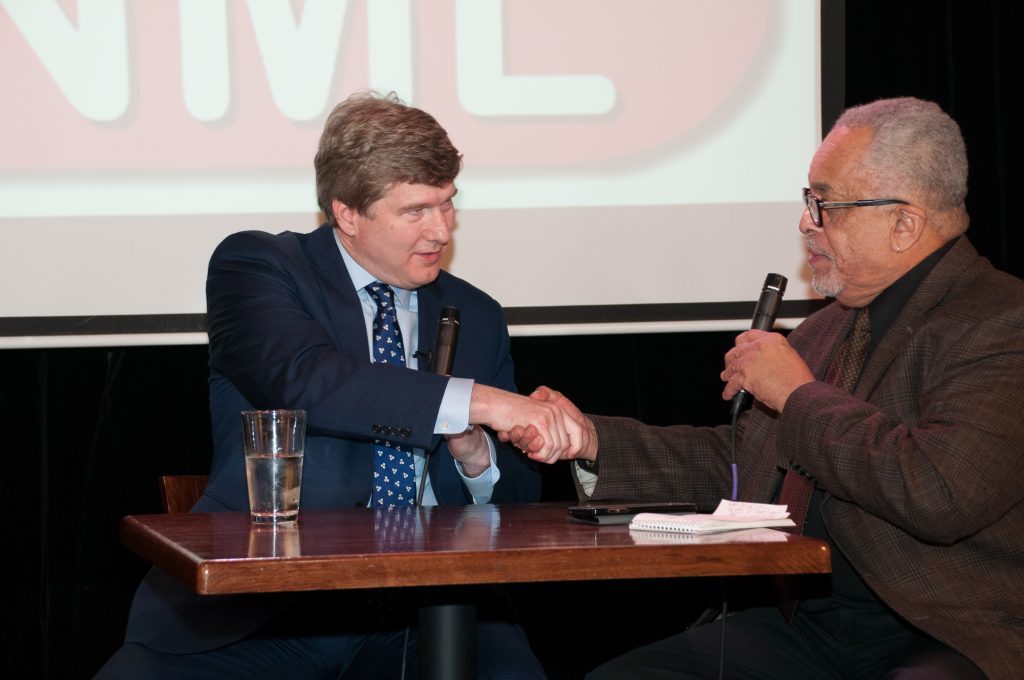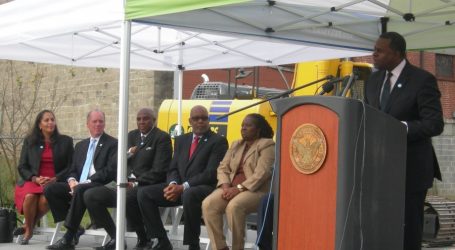“Race frames this election”!
Peter Aman Opens His Atlanta Mayoral Campaign Headquarters on “Sweet” Auburn Avenue
By Maynard Eaton
Peter Aman, Atlanta’s former Chief Operating Officer, has brazenly put the issue of race on front street in his bid to be elected Atlanta’s next mayor. Aman is one of the three white candidates in the field of ten running for the office. He is boldly making a purposeful pitch to Atlanta’s coveted black electorate. If victorious, Aman would be Atlanta’s first white mayor in 35 years. That’s when the late Mayor Maynard Jackson defeated incumbent Sam Massell in 1974.
“I’ve admired his passion for solving problems and not caring who gets the credit, and I marvel at this ability to calmly look at situations and make the right decision even if it costs him something,” opines his good friend Constance Lewis. “I’ve worked with all of the eight major candidates for mayor, and here is what I know for sure, Peter is the leader we need to advance our city for everyone.”
That’s why Aman is fearlessly challenging his opponents to speak honestly and openly about race in this campaign. To hammer home the point, in his spirited and strategic bid to be elected Atlanta’s 60th mayor, Aman recently opened his campaign headquarters on Auburn Avenue in the historic Odds Fellow Building.
“Built more than a century ago and dedicated by Booker T. Washington in 1912, this was where African Americans in Atlanta came to watch the movies and they could sit anywhere they wanted to. This was a special and unique place,” Aman said in his opening remarks about significance of the Odd Fellows Building during his official campaign headquarters opening announcement. “Through the 20’s and 30’s this is where black Atlanta came to network and socialize. African American owned businesses thrived here, and everyone came here to shop. This, at a time, when white businesses refused black patrons the dignity they deserved.”
Auburn Avenue is a revered and legendary street in the history of African America. It’s righteously known as “Sweet” Auburn Avenue, a term coined by John Wesley Dobbs, because it was once considered “the richest Negro street in the world.” It was the heartbeat of soul music artists such as “Gorgeous” George and James Brown who performed on stage at The Royal Peacock back in the day. It was also home to the civil rights movement led by the likes of Rev. Martin Luther King, Jr. and Congressman John Lewis among many others. Dobbs, an African-American civic and political leader, was often referred to as unofficial “mayor” of Auburn Avenue.
“Sweet” Auburn was designated a National Historic Landmark in 1976, according to the National Parks Service. However, like so many other inner-city neighborhoods, Sweet Auburn fell victim to lack of investment, crime and abandonment, compounded by highway construction that split it in two. In 1992 the National Trust for Historic Preservation recognized that it was one of America’s 11 Most Endangered Historic Places. The Historic District Development Corporation (HDDC) was formed to turn the trend around, starting with houses surrounding the birth home of Dr. Martin Luther King, Jr., and working outward.
Aman vows to relieve and reverse the tough times for “Sweet” Auburn and other inner-city Atlanta communities crippled by poverty, joblessness, gentrification and displacement.
“Indeed, this whole Sweet Auburn District served as an incubator for some of our nation’s boldest and most courageous leaders,” he told a diverse crowd of about 125 supporters. “They say ‘Atlanta is the City Too Busy to Hate’. For some though that slogan is now divorced from reality. Race has been and remains a part of Atlanta’s story. We must acknowledge this, for the greatness of our city will only be fully realized if we have more ongoing, honest conversations about race and its impact on the city.”
Aman persuasively argues that the black/white issue frames this mayoral election. He contends far too many voters have already segregated the candidates based on race rather than record. He calls that racial calculus.
“While there are some who would like to believe that race is not a factor in the election, there are others who know better and avoid the issue as if it were some taboo topic never to be discussed. I refuse to ignore the fact that race still plays a leading role in how this election is being framed,” Aman told his racially mixed audience. “If the leading white candidate gets X votes, and the African American candidates split the other votes, then XYZ will happen. Race frames this election, and I will not shrink from discussing it.”
After hearing his forthright comments about Atlanta’s racial climate –words that startled some in the Odd Fellows Building atrium – realtor Chip Franzoni says he thinks Aman is “the guy” and the right man to lead Atlanta forward.
“He is going to approach the hard issues and have the honest discussions that need to be had and not buried under the carpet and pretend that issues don’t exist,” Franzoni says. “He touched on the issues of race, and that is an issue in this city. It’s not fixed. For him to pick this building as his campaign headquarters, that alone is a statement of how he wants to approach these issues head on.”
John Hammond is also an Aman ally and the former national CEO for the 110 Black Men of America. “Race is always a factor, particularly in an Atlanta election,” he says. “The city of Atlanta has done a marvelous job about mitigating some of the issues associated with race, but non-the-less race continues to sort of shape our city.”
Jamison Jones is a young black family man who exuberantly introduced Aman at his June 8th campaign rally. Jones is an Atlanta native and proud “Grady baby” who grew up in one of Atlanta’s most crime ridden communities.
“We share the same values, we believe in Atlanta,” Jones tells this reporter. “I don’t believe in a color, I don’t believe in a race, I believe in somebody who’s for me and for my neighborhood. I’m from one of the roughest area’s in Atlanta, I’m from the ‘The Bluff’. I’ve seen it stay the same. So, what has a black mayor done differently than what Peter can’t do. So, if Peter tells me he has a plan to change that, I’m believing in Peter as a person and not as a white man.”
Critics may say Aman is pandering to black Atlanta. Quite the contrary he argues. Race is a real and divisive issue that must be honestly debated.
“Aman is in this mayoral race to blunt Mary Norwood,” argues conservative political pundit Shelley Wynter. “In that vein, of course, he wants to discuss race. It’s clear that Norwood’s the frontrunner based on her second-place performance the last time around.”
Aman adamantly denies and dismisses such an analysis. He is a fresh face who has emerged as a primetime player in this crowded field of mayoral candidates. This is his first bid for elective office —but he’s not new to City Hall. He ran the day-to-day-operations of the city as the Chief Operating Officer in Mayor Reed’s administration. He even disbanded the notorious Red Dog Atlanta police unit because of their controversial behavior.
“So many people you talk to, one of the first things they bring up is some element of race,” says during an interview following his speech. It may be, ‘Oh you’re the white candidate’ or ‘Can a white candidate win’ or ‘Has the city shifted from one to the other?’” It’s certainly not the only thing I want to talk about. I want to talk about education and mobility and transportation and equity and greenspace, and gentrification. We must talk about all those issues, but race just comes up in so many ways in each of those issues like equity without recognizing the fundamental inequities that exist in how African Americans have been treated from slavery to redlining. So, race really does kind of frame everything.”



